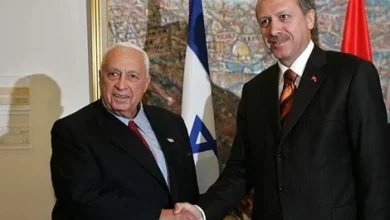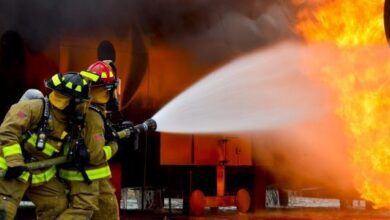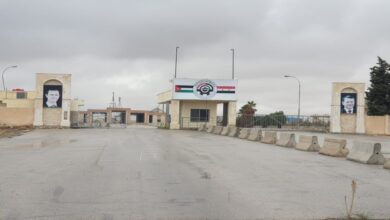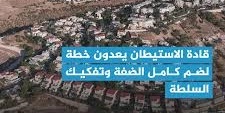الصراع على السودان.. محاور دولية بأدوات محلية
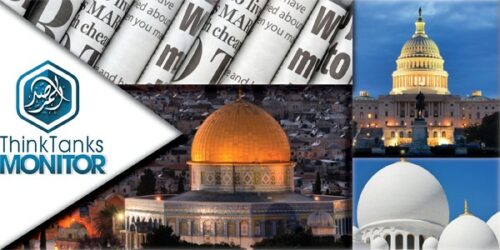

د. منذر سليمان وجعفر الجعفري/ واشنطن
قرار بدء الحرب وقرار “الوقف المؤقت” لإطلاق النار أُعلنا من واشنطن، في سابقة فريدة من نوعها: اليمن في الحالة الأولى عبر وزير الخارجية السعودي عادل الجبير في 26 آذار/مارس 2015، والسودان في الحالة الثانية بلسان وزير الخارجية الأميركي توني بلينكن في 24 نيسان / إبريل الحالي.
ثمة عوامل مشتركة تجمع قراري الحربين، لكن من المفيد الإشارة إلى أنّ “مرتزقة” عسكريين من السودان شكلوا أكبر جسم قتالي لراعِيَي الحرب في اليمن، السعودية والإمارات، بدلالة أعداد الأسرى والجرحى منهم لدى الحكومة اليمنية، واكتساب عناصرهم خبرات ميدانية سيتم توظيفها في ميادين أخرى لاحقاً.
أولئك “المرتزقة” يتبعون قيادة الدعم السريع بقيادة محمد حمدان دقلو، الملقب بـ “حميدتي”، والتي تشكّلت عام 2013. ويمكن القول إنّ “دوراً إقليمياً ما” كان يُعدّ لتلك القوات، ليس من مموّلي حرب اليمن، السعودية والإمارات، فحسب، بل من أركان الاستراتيجية الأميركية أيضاً، للسيطرة على ممرات البحر الأحمر في الدرجة الأولى وإخضاع اليمن للهيمنة الأميركية.
في الحربين، برز أيضاً الدور الفاعل “للكيان الإسرائيلي” تصاعدياً بإنشاء قاعدة عسكرية في جزيرة سقطرى التي تسيطر عليها الإمارت. وفي الصراع الجاري في السودان، عرضت “تل أبيب وساطتها” باستضافة قيادة فريقي الصراع في فلسطين المحتلة (نشرة “آكسيوس” الأميركية، 24 نيسان / إبريل 2023).
وأضافت النشرة المذكورة أنّ تفاصيل الحراك “الإسرائيلي” بشأن التوسط لدى طرفي القتال في السودان تمت بتنسيق تام مع كل من إدارة الرئيس بايدن ودولة الإمارات.
من دون الخوض في تفاصيل القتال وأسباب اندلاعه بين الفريقين رغم أهميتها، يجب فحص وتحديد الطرف أو الأطراف المستفيدة مما يحدق بالسودان بعد اقتطاع جنوبه وحرمانه من ثروته النفطية، وما يتداول من جدل واهتمام دولي بشأن مستقبل إقليم دارفور في غرب السودان، نظراً إلى ثرواته المعدنية، وأبرزها الذهب، وتحديد الأطراف الإقليمية المساعدة في تفكيك السودان.
سنستثني لبرهة الدور المنتظر من مصر وتأييدها المعلن للقوات المركزية السودانية بقيادة عبد الفتاح البرهان، وكذلك انشغالها بترتيبات جارية لاقتسام مياه النيل العابر لكل أراضي السودان، والتركيز على سمات الاستراتيجية الأميركية، وخصوصاً عقب تأهيل “القيادة الأميركية لأفريقيا – أفريكوم” لإدارة الأزمات في القارة السمراء، من أجل سبر أغوار إعلان وزير الخارجية الأميركية عن “وقف مؤقّت لإطلاق النار لمدة 72 ساعة”، بحسب توقيت واشنطن، وليس لاعتبارات تحفظ حرمة عيد الفطر.
لماذا السودان؟
لا تخفي مراكز القوة الفعلية وصناعة القرار في الولايات المتحدة، وامتداداً في عموم الغرب، أطماعها للفوز بثروات السودان الطبيعية والباطنية، والعين دائماً على استهداف مصر دوراً وموقعاً وحضارة ونفوذاً إقليمياً.
يشكّل السودان “موقعاً استراتيجياً غنيّاً بالموارد الطبيعية”، هذا التوصيف يوجز رؤية صنّاع القرار في واشنطن والعواصم الغربية الأخرى التي “تطمع كلها للفوز بقطعة منه، لأنه مرشّح للاستحواذ” والسيطرة عليه (صحيفة “نيويورك تايمز”، 22 نيسان / إبريل 2023).
هذا هو هدف الغرب المعلن باختصار شديد. أما توقيت اندلاع الصراع على السيطرة بين قادة الطرفين المواليين لأجندة واشنطن، فله بعد دولي يدخل في صلب الصراع الكوني بين الولايات المتحدة ومنافسيها في روسيا والصين، وجوهره موافقة السودان، منذ عهد الرئيس المخلوع عمر البشير، وتباعاً من البرهان وحميدتي، على إنشاء قاعدة بحرية روسية.
في هذا السياق الواسع لرقعة الصراع، نجد لاعبين آخرين من دول النفط العربية نيابة عن واشنطن، الإمارات والسعودية وقطر، قدموا، وما زالوا يقدمون، إمدادات عسكرية في الدرجة الأولى لقطبيي الصراع الحالي، البرهان وحميدتي.
أيضا، لا يجوز إغفال العامل “الإسرائيلي” في تأجيج الصراع والدخول على خط “فرض وقف إطلاق نار”. وفي الجوهر، تفكيك كيان السودان الحالي، بعد نجاح الغرب وأدواته المحلية في فسخ جنوب السودان عن باقي أراضيه.
في اللحظة الحالية، يجري تسليط الضوء في دول الغرب على “دور دولة الإمارات العربية المتحدة التي توسّع نفوذها بقوة في منطقة القرن الإفريقي”. وقد رمت أبو ظبي مبكراً إلى استغلال مساحة أراضي السودان الشاسعه “لتلبية احتياجاتها الغذائية واستمرار سبل توريدها”، أبرزها صفقة شراء أراضٍ شاسعة لحساب “الشيخ طحنون بن زايد تبلغ مساحتها 100 ألف هكتار (ما يعادل أكثر من 400 ألف دونم) وقيمتها 225 مليون دولار” (صحيفة “نيويورك تايمز”، 22 نيسان / إبريل 2023).
وفي السياق ذاته، ينبغي رؤية دخول قطر على خطّ تأجيج أزمات السودان، وخصوصاً بعد نشوب خلافات بينها وبين كل من السعودية والإمارات، وفي الخلفية إحجام الخرطوم والرئيس عمر البشير عن الاصطفاف معها ضد جيرانها. وليس من باب المصادفة تحرك السعودية والإمارات مباشرةً بعد إطاحة الرئيس البشير وإعلانهما تقديم مساعدة مالية للسودان “الجديد” قيمتها 3 مليارات دولار .
وترى أوساط النخب السياسية الأميركية أنّ الجنرال حميدتي، كما يسمّى، كدّس ثروة هائلة جراء دوره في “التنقيب عن الذهب والاتجار به وتصديره إلى أسواق دبي” في الإمارات. وقد ارتكز على ما جناه من إيداعاته في المصارف الإماراتية لإنشاء قوات شبه نظامية “تتفوق في تسليحها على الجيش السوداني الرسمي”، وتم نشر أعداد كبيرة منها في اليمن لحساب الإمارات والسعودية في قتال اليمنيين.
عند استعراض “السيناريوهات” المستقبلية للصراع الجاري، من وجهة النظر الأميركية في الدرجة الأولى، نجد أن جوهرها يصب في خانة استمرار وتيرة الصراع بين الطرفين، وضمان استمرار توريد الأسلحة المختلفة، والحيلولة دون انتصار فريق على آخر بشكل حاسم.
بعض الأختصاصيين أشاروا إلى “توريد بقايا داعش والقاعدة” من ليبيا وسوريا وبلدان أخرى باتجاه المسرح السوداني، فضلاً عن نضوج مناخات تجنيد جماعات طائفية وعرقية سودانية وتسليحها.
في المقابل، تنشط “الجهود الديبلوماسية” الغربية المطالبة بتمديد وقف إطلاق النار، والنفخ في بوق إجلاء الرعايا الأجانب، فيما يستمر التستّر على بقاء فرق “القوات الخاصة والخبراء العسكريين والأمنيين” في السودان لإدارة المعركة، والمهمة الموكلة إليهم عنوانها قطع دابر روسيا وتمدد الصين في عموم القرن الإفريقي.
نستطيع القول إنّ هدف الغرب الآني، إلى جانب تفسيخ السودان، هو السعي لمحاصرة مصر وتعطيل دورها الإقليمي، وإبقائها أسيرة أزماتها المعيشية، وحرمانها من ترجمة ثقلها ونفوذها الطبيعي في عموم المنطقة.
وفي تفاصيل مخطّط استهداف مصر، تستعرض الأوساط المالية الدولية “مصادر تمويل بناء سد كهرومائي ضخم على مجرى نهر النيل الأبيض” في دولة ما يُسمى جنوب السودان، الأمر الذي سيقلص حصة مصر من مياه النيل، وخصوصاً بعد تداعيات “سد النهضة” في إثيوبيا وحجبه كمية وفيرة من المياه.
من نافل القول أنّ ظاهر الاستراتيجية الأميركية، فيما يخص مصادر المياه، هو “تسليعها وبيعها”، بحيث تأخذ إبعاداً سياسية واقتصادية وبيئية أيضاً، نجد ترجمتها في تقليص رقعة الأراضي الزراعية في مصر تحديداً، وتقليص نصيب المواطن المصري من مياه الشرب.
بموازاة ما تقدم من التحكم في مصادر المياه، بإشراف غربي مباشر أو غير مباشر، تبرز تركيا أيضاً التي أنشأت عددا من السدود المائية، والتي تخطط لإنشاء سدود أخرى، بغية التحكم في القرار السياسي لكل من سوريا والعراق.
للأسباب المذكورة أعلاه، يبقى احتمال استمرار الصراع المسلح في السودان، وإن تباينت وتيرته بين آونة وأخرى، هو المرجّح في أولويات الاستراتيجية الأميركية، لبسط هيمنتها إقليمياً وسد الطريق أمام خصومها الدوليين، روسيا والصين، إن استطاعت إلى ذلك سبيلاً.
Crisis in Sudan
What began as peaceful protests on Sudan’s political future has now spread into fighting throughout the capital of Khartoum. The fighting isn’t regional, so the center of the fighting is in the capital, for the moment. More than 400 have died in the fighting, including one American. 3,551 have been wounded according to the World Health Organization.
The ferocity of the fighting is threatening the foreign embassy staff and foreign citizens in Khartoum. However, the White House has no plans to evacuate all Americans.
The fighting is a result of the ouster of Sudan’s leader Omar al-Bashir in 2019. The military seized power two years later, but then split into the two forces that are now fighting in Khartoum.
The Rapid Support forces have declared a 72-hour ceasefire for the end of Ramadan, although the other side, Sudan Armed forces haven’ confirmed that they will recognize the ceasefire.
The fighting is basically between the Sudan Armed forces (SAF) controlled by General Abdel Fattah al-Burhan and Rapid Support Forces (RSF) controlled by General Mohamed Hamdan Dagalo. Dagalo had served under al-Burhan as deputy head of state.
The RSF has reportedly taken over the nation’s radio and television studios (Media House) on Friday.
Most of the fighting is taking place on the north side of the city.
While the US has made it clear that it can’t evacuate American citizens, Saudi Arabia has managed to evacuate some of its citizens.
Meanwhile, White House National Security spokesman John Kirby said, “Americans should have no expectation of a US government coordinated evacuation at this time. And we expect that’s going to remain the case.”
He continued, “It’s absolutely imperative that US citizens in Sudan make their own arrangements to stay safe.”
The US embassy estimates there are about 16,000 Americans in the Sudan, although that number is underreported because there is no need for Americans to register with the embassy.
The Sudanese Army has been in contact with other nations and has said that it is coordinating efforts to evacuate foreigners by military aircraft. However, there are problems with that plan.
First, there aren’t any safe airfields in or around Khartoum. In fact, they have been major battlegrounds in the last few days and runways have been damaged.
The second problem is that convoys are dangerous now and residential areas are scenes of serious fighting. A ceasefire would be ideal, but several ceasefires have not been observed, even the one called to celebrate the end of Ramadan.
The third problem is that only the US has the airlift capability to evacuate large numbers of people. However, using US aircraft to evacuate non-American citizens, while leaving US nationals to find their way out would be a political disaster as the presidential primary elections are just months away.
Finally, while the Sudanese Army has pledged its support, they are heavily engaged in this war in Khartoum. They may be unable to help in an evacuation. And they are certainly unable to establish a safe zone around any local airfield.
With the death of an American, the pressure to evacuate will grow. However, political issues may cloud the issue as American heads into an election year.
Evacuating Americans can become a major political issue. The White House doesn’t want a Sudan evacuation to look like the American evacuation of Kabul. Americans remember the last-minute evacuation of the US embassy in Saigon in 1975, the botched rescue of American embassy personnel from Tehran in 1980, and the Kabul disaster in 2021.
No wonder the White House has told Americans not to go to the embassy.
So, what is the US doing to arrange an evacuation? Defense Secretary Austin said the troop moves by the US military are intended “to ensure that we provide as many options as possible, if we are called upon to do something.” He added,” We haven’t been called upon to do anything yet.”
US Africa Command (AFRICOM) has said that they are monitoring the situation and, “conducting prudent planning for various contingencies.”
AFRICOM will be the command to manage the evacuation, not CENTCOM, which mismanaged the evacuation of Kabul.
A small number of US troops have landed in Djibouti, and more are expected to pre-position troops and equipment for a limited evacuation. It is expected to be a low-profile evacuation to limit an embarrassing failure. Communications will be limited to the evacuation forces and embassy personnel to limit the appearance of the American media.
Although we don’t know how the evacuation is currently being planned, it’s likely that the US Embassy will be a critical part. The embassy is fortified and protected by a Marine contingent. There is also space to land helicopters, probably CH-46 Sea Knights and CH-47 Chinooks. Depending on circumstances, they can carry 20-30 people each.
This is a low-risk operation, providing other Americans aren’t aware of it and are not trying to get into the embassy grounds. If not, it will become a political bombshell for Biden as the press shows pictures of frantic Americans trying to reach the safety of the embassy.
If the embassy isn’t a good site for evacuation, a sports stadium is also ideal. The field is large enough to land helicopters and the stadium stands and fencing will provide a perimeter that US forces can use to limit access.
The US State Department could negotiate a ceasefire to allow Americans to get out of Khartoum. However, it has become clear that the US no longer has the political clout to impose a ceasefire. Any chance of a ceasefire will depend on the two sides and how a ceasefire will benefit them.
If the White House makes the politically dangerous decision to abandon the rest of Americans in Sudan, less than a dozen helicopters can evacuate the US embassy staff. A trip of several hours can bring them to Djibouti.
If the White House decides to expand the evacuation, they will need an airfield near the capital that can handle cargo aircraft. Then the helicopters would ferry the evacuees from the embassy or other evacuation point to the airfield, where the cargo aircraft would take them to Djibouti.
No matter how the evacuation goes, there will be political repercussions both in American and abroad. A well-managed evacuation of all Americans in Sudan will demonstrate the military prowess and long arm of the US military. The ability to quickly deploy sizable US forces to remote areas will make nations like Russia, China, North Korea, and Iran think twice.
A successful evacuation of embassy personnel, while other American civilians are at risk will show that the White House is risk averse and encourage enemies of America to hold Americans as hostages.
A disaster in any evacuation will demonstrate to the world that the US is a “paper tiger,” that can’t defend its friends or confront its enemies.
The domestic political ramifications would be dire. Failure to evacuate all Americans will be reflected in the upcoming elections, especially as 16,000 Americans probably have many voters that are friends or family.
A catastrophe of any size will probably doom Biden’s reelection chances just as the failure to rescue American embassy staff in Iran in 1980 doomed President Carter’s reelection campaign.
Detect languageAfrikaansAlbanianArabicArmenianAzerbaijaniBasqueBelarusianBengaliBosnianBulgarianCatalanCebuanoChichewaChinese (Simplified)Chinese (Traditional)CroatianCzechDanishDutchEnglishEsperantoEstonianFilipinoFinnishFrenchGalicianGeorgianGermanGreekGujaratiHaitian CreoleHausaHebrewHindiHmongHungarianIcelandicIgboIndonesianIrishItalianJapaneseJavaneseKannadaKazakhKhmerKoreanLaoLatinLatvianLithuanianMacedonianMalagasyMalayMalayalamMalteseMaoriMarathiMongolianMyanmar (Burmese)NepaliNorwegianPersianPolishPortuguesePunjabiRomanianRussianSerbianSesothoSinhalaSlovakSlovenianSomaliSpanishSundaneseSwahiliSwedishTajikTamilTeluguThaiTurkishUkrainianUrduUzbekVietnameseWelshYiddishYorubaZulu AfrikaansAlbanianArabicArmenianAzerbaijaniBasqueBelarusianBengaliBosnianBulgarianCatalanCebuanoChichewaChinese (Simplified)Chinese (Traditional)CroatianCzechDanishDutchEnglishEsperantoEstonianFilipinoFinnishFrenchGalicianGeorgianGermanGreekGujaratiHaitian CreoleHausaHebrewHindiHmongHungarianIcelandicIgboIndonesianIrishItalianJapaneseJavaneseKannadaKazakhKhmerKoreanLaoLatinLatvianLithuanianMacedonianMalagasyMalayMalayalamMalteseMaoriMarathiMongolianMyanmar (Burmese)NepaliNorwegianPersianPolishPortuguesePunjabiRomanianRussianSerbianSesothoSinhalaSlovakSlovenianSomaliSpanishSundaneseSwahiliSwedishTajikTamilTeluguThaiTurkishUkrainianUrduUzbekVietnameseWelshYiddishYorubaZulu
Options : History : Feedback : Donate
Close

